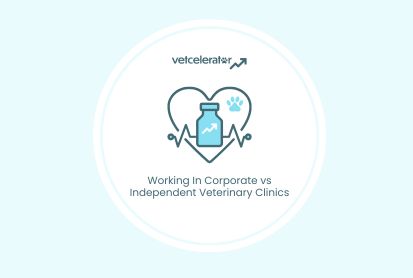
Let’s get one thing clear right from the start. There’s nothing inherently “wrong” with choosing to work either at a corporate or private veterinary clinic. Both can offer rewarding paths in veterinary careers, supportive teams, and great learning experiences, depending on the individual practice. But the key to long-term satisfaction and success? Finding the right fit for you, your goals, and your personality.
Not all clinics are created equal, even within the same category.
Some former private practices may now be owned by larger corporate groups but still operate with the same close-knit culture and values. On the flip side, some independent clinics may run multiple locations and function more like a mini-corporate chain. It’s not always black and white, which is why you should do your homework (including interview prep) before looking for a veterinary job.
You will want to understand the differences between these two practice types in order to make a confident, informed choice.
Why Work in a Corporate Veterinary Clinic?

Broader Geographic Reach and Transfer Opportunities
Corporate veterinary groups typically operate multiple clinics across a region or nationally. This interconnected system offers flexibility to transfer locations without changing employers, which can be ideal for those considering relocation or veterinary career mobility.

Larger Team Structures
You’re more likely to work with multiple DVMs and a comprehensive support staff, which can foster collaboration and shared responsibilities in day-to-day operations.

Access to Advanced Tools and Systems
Corporate-owned veterinary clinics often invest in modern equipment, digital infrastructure, and operational efficiencies, giving veterinary professionals access to tools that support care.

Competitive Compensation and Benefits
Salaries, sign-on bonuses, relocation stipends, and student loan repayment assistance are often stronger in corporate settings. Benefits packages typically include health insurance, paid time off, CE allowances, and 401(k) matching.

Structured Training and Career Development
Formal onboarding processes, continuing education platforms, and established growth pathways are commonly offered, especially for new graduates seeking structured mentorship to further their veterinary career.
What Are the Drawbacks of Corporate Veterinary Jobs?
High Productivity Expectations
Many corporate veterinary clinics are production-focused, requiring high caseloads and long hours. Without proper balance, this can lead to fatigue and burnout.
Limited Personalized Mentorship
While there may be multiple veterinarians on staff, not all veterinary practices foster a mentoring culture. DVMs may be focused on meeting their own performance goals, leaving limited time for teaching.
Centralized Decision-Making
Corporate decisions are often made by regional or head office leadership. If decisions cannot be made within the clinic, this can lead to reduced flexibility at the clinic level and limit your input on daily operations or staffing.
Inconsistencies in Support Staff Training
High turnover in support staff paired with rapid hiring to meet demand can impact the clinic’s efficiency and quality of team dynamics.
What Are the Benefits of Working in a Privately-Owned Vet Clinic?

Close-Knit Workplace Culture
Smaller, independently-owned clinics often foster a more personal environment. Team members tend to develop strong working relationships, and ownership is typically more present and involved.

Personalized Mentorship and Professional Support
Private practice owners are often hands-on and committed to supporting their team’s development. If you’re a new graduate or an experienced veterinarian interested in a new specialty, you’re more likely to receive direct guidance and mentorship.

Greater Medical Autonomy
Veterinarians in private practices typically enjoy more independence in their decision-making. Without rigid corporate policies, clinicians can base treatment approaches on each patient and client.

Stronger Continuity of Care
The ability to build lasting relationships with clients and patients is often a valued feature of private veterinary practice. With fewer changes in staff and structure, you’ll be able to foster trust and deliver more consistent care.

Healthier Work-Life Balance
Because leadership is on-site, there’s greater awareness of team morale and workloads. Many private practice owners prioritize their team and are responsive to staff needs.
Are There Downsides to Jobs at Independent Veterinary Practices?
Variable Compensation Packages
While some private clinics can match corporate salaries, others may fall short in base pay or bonuses. However, they may offer other forms of value, such as flexible scheduling, equity opportunities, or long-term career investment.
Limited Advancement Structures
Without the formal ladder of a corporate system, advancement may be less defined. That said, many private practices offer growth through leadership responsibilities, skill development, or potential ownership.
Smaller Teams and Resources
Support staff may be limited, requiring team members to be flexible and collaborative. Sometimes it can take more time for privately-owned veterinary clinics to replace staff that leaves or expensive resources
Questions Veterinary Professionals Should Consider While Looking for a Job
To determine which setting is right for you, corporate vs independent, consider the following:
- What level of mentorship do I need right now?
- Do I prefer a structured or flexible environment?
- How important is compensation compared to culture and schedule?
- Do I want to specialize or take on a leadership role in the future?
- Am I comfortable in a high-volume, fast-paced setting?
- Do I want a close connection with clients and patients?
Choose the Veterinary Clinic that is Right for You
The best option is the veterinary practice that’s best suited to your individual needs, career goals, and preferences.
A corporate vet clinic might offer the structure and financial package you’re seeking. A private practice may provide the mentorship, autonomy, and connection that keep you feeling fulfilled and supported long-term.
If you are unsure what you want for your veterinary career, take the time to explore both options. Visit clinics, speak with current staff, ask detailed questions during interviews, and, most importantly, trust your instincts.
Need guidance finding the right clinic for your next role or are you a practice owner or manager looking to hire? Vetcelerator has recruiting services for veterinary clinics across the United States. We match veterinary professionals with practices that align with their values and career goals. Reach out to us to start your search with confidence.




